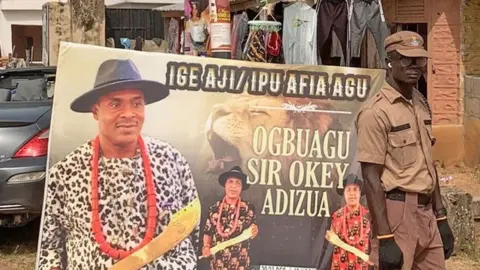 Princess Tricia Nwaubani
Princess Tricia NwaubaniAt the age of 60, Nigerian businessman and health professional Ken Okoroafor has achieved his childhood dream of being given the esteemed title of 'Leopard Killer'.
Jubilant crowds thronged as he was inducted into the prestigious and all-male Igbuu society in his hometown of Oguta, in southeastern Nigeria.
In ancient times, killing a leopard was not just an act of bravery, but a ritual feat that conferred social prestige.
To become a “leopard killer”, known as “ogbuagu” in the Igbo language, one had to present a leopard – hunted down and killed by himself – to the local king. Its meat was then distributed among 25 villages around Oguta.
Over time, the practice evolved and people no longer had to hunt the leopard themselves.
My mother remembers the carcass of a leopard lying in their living room in 1955 when her father took the title. It was caught for him by a professional hunter.
She recalls eating leopard meat twice in the past: “It tastes wild and a little salty.”
Conservation concerns then ended the use of leopards as they became scarce in the region. The last known sacrifice of a leopard occurred in 1987.
Once widespread in Nigeria, leopards are now only found in a few national parks where they are protected.
Today, the financial equivalent – a substantial but undisclosed sum – is distributed among the heads of families in the 25 villages, maintaining the community spirit of the tradition.
“In Oguta, when you join this society, you get respect and you join them in most decisions in the town,” said Mr Okoroafor, who has lived in the US for decades but returned to his roots to become Ogbuagu.
“That's what attracted me. It's something I've been hoping to join since I was a little boy.”
The first recorded use of money as a substitute dates back to 1942, when a man named Mberekpe Ojirika caught a leopard for the ceremony, but then his mother died.
Tradition dictates that Ojirika must mourn for six months and cannot continue with the ritual. When he later tried to find another leopard, he was unsuccessful.
Understanding the difficulty, his relative, Eze Igwe – the traditional king of Oguta – allowed him to pay four shillings instead of providing a leopard.
“From that moment, you now have a choice to use money or leopard,” said Victor Aniche, 52, the current secretary of the Igbuu society and Ojirika's grandson.
“When I made my own in 2012, someone offered to bring me a live leopard from northern Nigeria. They were going to sell me one. But I couldn't imagine killing an endangered animal,” said Mr Aniche, a mechanical engineer and Cambridge University graduate.
But today, the path to becoming an Ogbuagu is still rigorous and involves three complex stages.
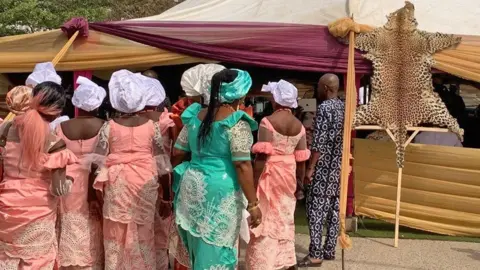 Princess Tricia Nwaubani
Princess Tricia NwaubaniThe Igbu community, of which there are about 75 current members, is as old as Oguta itself, tracing its roots back over four centuries to the founding of the city by migrants from the ancient kingdom of Benin.
Despite their Igbo ethnic classification, the Oguta people maintain a distinct identity. Their dialect, customs and traditions set them apart from the local and diaspora population, estimated by various sources at nearly 200,000.
Many of those who wish to become Ogbuagu choose to go through their ceremonies during the festive Christmas season, allowing families and diaspora communities to come together, often attracting large crowds.
On December 21, Zubi Ndupu, a petrophysicist who works in Nigeria's oil sector, began his first stage of becoming a “leopard killer” known as “Igbu Agu” – when the hunt is recreated.
The day started at 09:00 with the Ogbuagu gathering in a large tent at Mr. Ndupu's home. They greeted each other by clanging their golden swords and exchanged pleasantries.
Although Eze Igwe did not attend public events, he sent a representative to join the ceremony.
The Ogbuagu sat in a hierarchical order determined by the date they became full members.
Women were not allowed to touch Ogbuagu, enter the assembly or participate in the ceremony, but I watched closely.
The Ogbuagu feasted on traditional dishes such as goat meat and pepper soup, nsala soup – made from catfish – pounded yams and palm wine.
During the ceremony, Mr Ndupu was called forward by the secretary: a palm leaf was tied to his wrist, marks were drawn on his hand with chalk and he was given a brand new gold colored sword engraved with his name.
He then went round the gathering, saluting each Ogbuagu and rattling his sword against theirs four times.
In the afternoon, after the feast, Mr. Ndupu was taken in a procession from his home. The 'Leopard Killers' walked in a pecking order, with the newest initiate, Mr Ndupu, positioned at the end of the line.
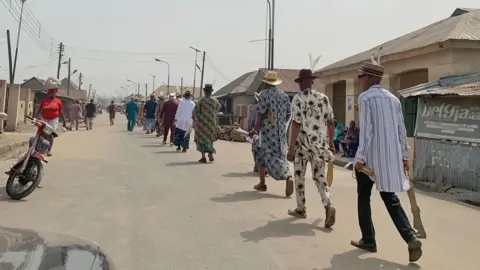 Princess Tricia Nwaubani
Princess Tricia NwaubaniThe group proceeded to Eze Igwe's palace where they presented money for the king's leopard.
The second stage known as “Iga Aji” is a spiritual segment held privately in the home of the initiate – with members of the Igbuu community present.
During this phase, the initiate is presented with a red sash, symbolizing royal authority, along with sacred beads and feathers.
After receiving his red belt, Mr. Okoroafor went to greet his relatives who had gathered in tents outside. They celebrated him with shouts of “Ogbuagu!” as they feasted and drank.
The final stage, “Ipu Afia Agu”, is a major celebration that marks the full membership of the initiate. The celebration begins at the home of the initiate's mother and later moves to his own residence.
This is the most expensive stage, often involving livestock, pools of fish and crates of liquor to entertain hundreds of guests.
After a recent gathering at his mother's home, Pascal Oki Adizua, a 60-year-old car dealer from Maryland in the US, was paraded around town with a symbolic fake leopard skin held high.
Accompanied by Ogbuagu, chanting women and lively music, his new status was celebrated with dancing, singing and feasting shared by all.
Mr Adizua had completed his first stage in 2023 but chose to wait until last December to complete the second and third stages so that his daughters – two doctors and a nurse – could attend.
“All my children have finished school. The last boy is the only one in the university. Many of my friends came from the US,” said Mr Adizua, who has lived abroad for 21 years.
Both Mr. Adizua and Mr. Okoroafor, who completed their second and third stages in December, can now enjoy the unparalleled prestige that comes with Igbuu membership.
The 'Leopard Killers' are called by their title 'Ogbuagu' throughout Igboland – and beyond.
In Oguta only they can stand and greet the king without bowing. Their presence commands respect at all events such as weddings, where they are given places of honor.
Ceremonial beads worn on the right wrist distinguish the Ogbuagu, symbolizing their status. At traditional events, they must wear specific clothing.
“The title 'Ogbuagu' is a name of praise,” explains Mr Aniche. “If you can go into the forest, stalk and kill a leopard, you are a warrior.”
Leadership in Igbuu follows a strict hierarchy where seniority is based on how long one has been a member rather than age. The member with the longest tenure holds the highest management position. The current leader is Emmanuel Udom, who is now in his early 80s.
In addition to the president who oversees the group's affairs and meetings, Igbuu members nominate and elect officers to handle day-to-day operations and administration. Mr. Anice has served as secretary for the past four years.
“We have members from their mid-40s to their 90s,” Mr Aniche said.
Some prominent Ogbuagu include the late Chukudifu Oputa, one of the most respected judges of the Supreme Court of Nigeria; Alban Uzoma Nwapa, a Swedish-Nigerian musician better known by his stage name Dr. Alban, and the late Gogo Nwakuche, a successful entrepreneur and husband of the late renowned writer Flora Nwapa.
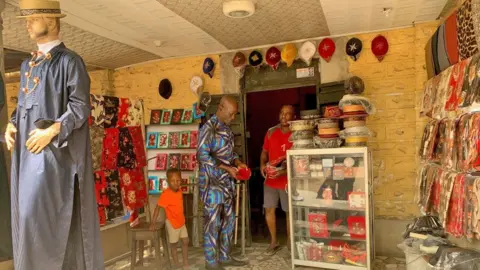 Princess Tricia Nwaubani
Princess Tricia NwaubaniIgbuu society is highly selective. Applicants must own property, have a provable income, be married or have been married, and maintain an unblemished reputation.
Descendants of slaves, known as “ohu”, are not allowed to join. These are people whose ancestors were owned by others through war or purchase—a remnant of a social order that some are now working to abolish.
“We are now saying it is time for this obnoxious, outdated, useless system to be scrapped so that we can be one,” said Odweni Nduka, a former Igbu secretary who is also the king's spokesman.
“If you go to America, some of our sons are married to black Americans, even some Ogbuagu. These black Americans are products of the same system, so what's the problem at home?'
He explained that the traditional process of abolishing the ohu system has already begun, with consultations taking place between families that once owned slaves. This is expected to lead to the introduction of traditional rituals that will officially declare them free from ohu status.
“Once that is done, Igbuu will call a meeting and start receiving them,” Mr Nduka said.
Despite its prestige, some criticize Igbuu, claiming that it only benefits the egos of its members.
At every ceremony I've attended, there's been at least one person in the crowd grumbling about how the thousands of dollars spent could be better used for city development or scholarship funding.
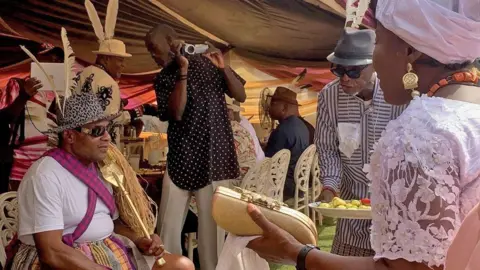 Princess Tricia Nwaubani
Princess Tricia NwaubaniBut Mr Aniche disagrees: “Igbu is not a society you come to achieve; it's a society you come to because you've already achieved.
“The Ogbuagu have brought more development to Oguta than others. They are the largest employers of labor.”
Mr. Aniche also pointed out that money spent on feasting and other ceremonial requirements goes back into the local economy.
Today, the membership of the Igbuu society spans the globe, with almost half of its members living in the diaspora. Yet, whether in Europe or the US, Oguta men remain deeply connected to their roots.
“I come back about three times every year because I love the Oguta tradition,” Mr Adizua said. “With all the stress in the diaspora, I like to come home to rest.”
For Mr Okoroafor, the journey from a young boy dreaming of leopard hunting to a respected Ogbuagu was well worth the wait.
“Oguta is a beautiful city where there are many people who have excelled in various fields,” he said, his voice brimming with pride.
“The last time I was home was in 2016 but now that I am Ogbuagu, I will come home more regularly.”
Adaobi Tricia Nwaubani is a Nigerian journalist and freelance writer based in Abuja and London.
You may also be interested in:
 Getty Images/BBC
Getty Images/BBC
